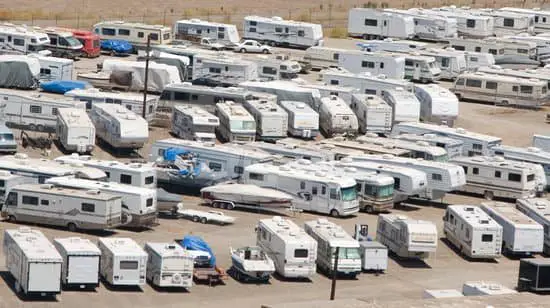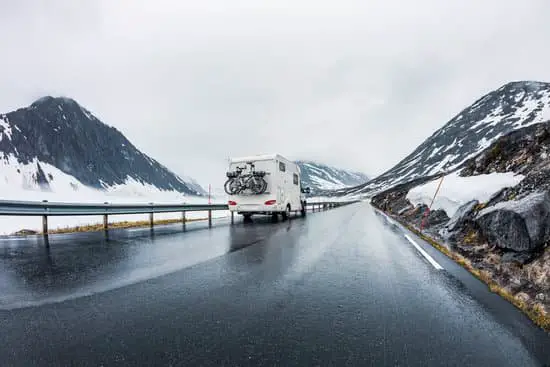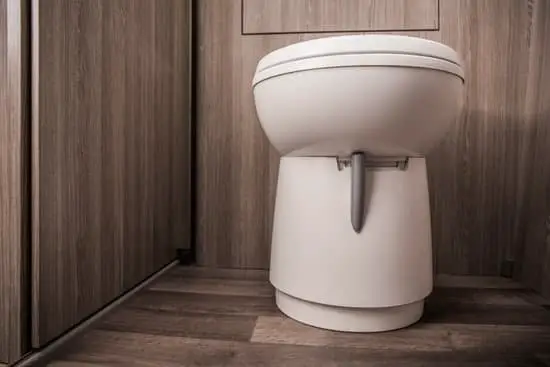RVs are fun to drive and live in, but they do come with a few drawbacks. One of the biggest is that your RV will take up space at home or on the road, which can be difficult to find especially if you travel often. If you’re trying to figure out how much it costs to store an RV, read this blog post for all of the information you need!
How much does it cost to store an RV? Outdoor storage will cost between $50 and $150 a month. Indoor storage costs at least twice as much, with the price depending on how big your RV is. This means that you’ll pay more for a Class A motorhome than a Class C.
Pricing can vary depending on where you live, with some states being more expensive than others. You may find that the cost is higher if your RV is covered or heated and lower for uncovered or unheated storage units.
Make sure to consider these factors when figuring out how much it costs to store an RV! Be aware of cheaper alternatives such as renting parking spaces from homeowners in public areas near major roads like highways. If this sounds too complicated, don’t worry, there are plenty of companies who will handle all the details so you won’t have anything else to think about!
Is covered RV storage worth it?
A covered RV storage unit is not only a much better option than an uncovered one, but it will also save you money in the long run. Think about all that snow and ice during the winter months or how things can get stolen from your car when left on display! A covered RV storage units cost more up front for sure, but this may be worth every penny once you calculate what could happen to your vehicle without protection.
A covered RV storage unit is one of the best ways to keep your vehicle safe and dry. They also protect it from sun damage, which could irreversibly damage paint jobs over time.
You can even find units with additional amenities like power outlets so you can use appliances while in storage or full-service hookups for water, sewer, and electricity that allow you to camp at night if needed!
Covered spaces also offer protection against theft because they’re difficult to break into. It’s important to note that not all facilities will have these features, but there should be some sort of security measures set up before entering such an arrangement.
What about costs? Is the extra cost worth it? Storing your RV in an outdoor lot is a less expensive option than storing it indoors. However, you are risking damage to the exterior of the vehicle due to wind and sun exposure among other weather conditions. You may also have difficulty finding parking near the facility which can make trips back and forth inconvenient as well as more time-consuming.
Where can I store my RV long-term?
The RV is one of the most fascinating and versatile vehicles on earth. There are many places you can park your camper long-term, including storage facilities (indoor, outdoor, heated and unheated), in your garage or driveway (depending on size) to avoid theft/possible damage from weather conditions like rain; at a curb right next door!
Since RVs offer such convenience for extended trips away from home – be it camping adventures near waterfalls deep in rural areas with few amenities or cruising around city streets checking off attractions that keep some people up all night thinking about them while others sleep soundly through their dreams – they also come with added benefits when parked close by. For example: Storage facilities will provide shelter during bad
In the driveway of a friend or family member. A commercial parking lot (if you’re willing to pay).
If you live in an apartment, condo, townhouse or similar type building with a shared garage and no storage unit available for rent from your landlord then there are few options left.
You will need to either buy/rent another space at one of the above locations if possible, get creative about where you can park it outside on public property near your place, or take up residence elsewhere while storing your RV long-term.
Is it better to store a camper with slide in or out?
When it comes time to store your RV, be sure and fold up the slide-outs before you park. This will stop any water or dirt from getting in through the seals that keep everything protected when traveling.
If you park it with the slides out and then fold them up, any water or dirt that gets into the folds will work its way along with the frame. This can lead to corrosion of metal parts which could be expensive to fix later on.
It’s worthwhile periodically testing the slide-outs if it’s been in storage for a long time. We recommend you do this monthly for the first six months and then quarterly from there on out to make sure everything is still working as it should be.
If your slide-outs are rusty or dirty, we recommend using a degreaser with an exterior-safe cleaner. This will help remove any dirt buildup that can occur when storage conditions vary wildly in terms of humidity, temperature etc…
It’s important not to store any food items in your RV while storing long term because they may attract bugs or rodents which can be very dangerous if they’re living behind closed walls undetected – remember mice carry hantavirus! Not good! So leave those dishes at home until you return.
Is it OK to leave your RV plugged in all the time?
When your RV is plugged into an electric outlet, the batteries charge. … While it may seem like a good idea to keep your RV plugged in at all times but not only does this take up more electricity than necessary, it also drains the water levels of our wet cell battery cells faster which can lead us down a slippery slope and force us to stop midway through our camping trip with no way home!
Pros of leaving your RV plugged in all the time: It’s convenient for charging devices at any time. Cons of leaving your RV plugged in all the time: Your battery life will decrease and there is a risk of damaging your battery.
Is it okay to store RV outside?
RVs have to be carefully stored in areas that are protected from the weather. If not, they can get damaged by sun exposure and rain. Investing in a cover is one way of protecting your RV so it lasts for years down the line.
A lot of people store their RV outside, but it can be a daunting prospect if you’re not sure how to go about doing so. Here are some tips on storing your RV outdoors:
- Make sure the area is protected from rain and sun with a sturdy cover or canopy.
- Invest in an electric charger for the battery that will work even when there’s no power supply available. This way, you won’t have to worry about draining the batteries during storage time.
- Use stabilizing jacks to keep your vehicle level as well as secure blocks beneath each wheel chock/bracket combination to help prevent rocking (and potential damage).
- Cover the tires to protect them from UV rays.
- Keep the vehicle away from combustible materials, such as a car or tree.
- Check for any rusting on the metal parts of your RV and fix it before storing. That’ll help avoid leaks that may damage floors while in storage.
- Clean out all cabinets, drawers, and closets to remove anything you don’t want inside when not being used. This includes food items that might spoil during storage time (don’t forget about canned goods). You should also take off all curtains, blinds, linens/blankets, cushions–anything else attached with velcro or zippers can be left outside so long as they’re covered well enough to protect them from dirt if it rains






